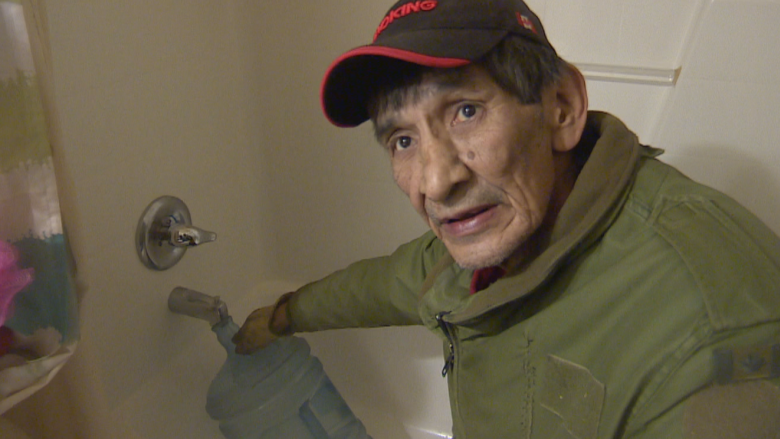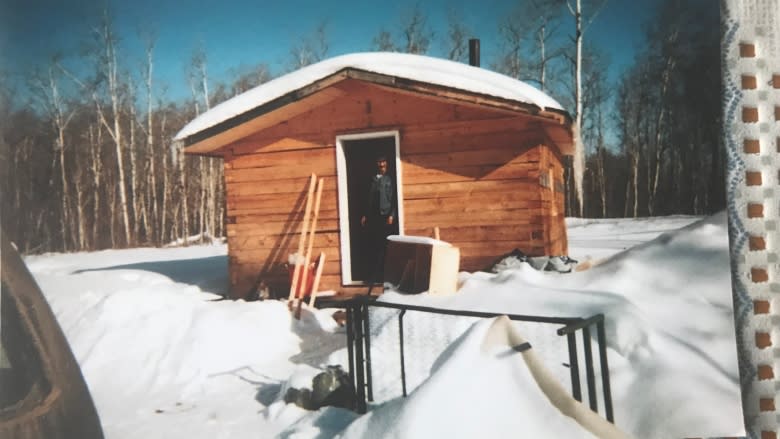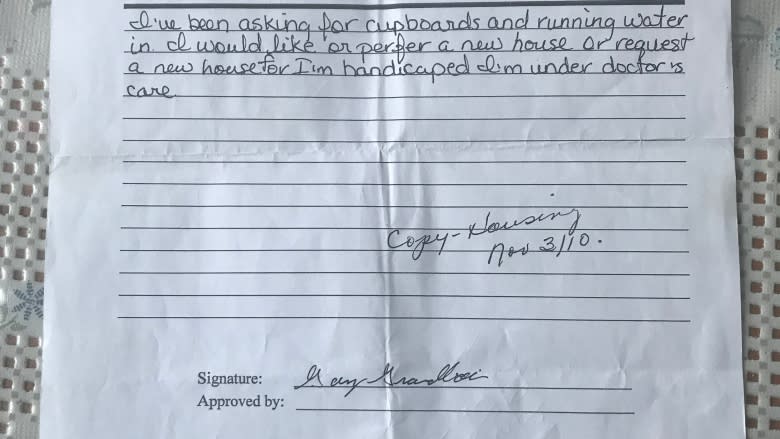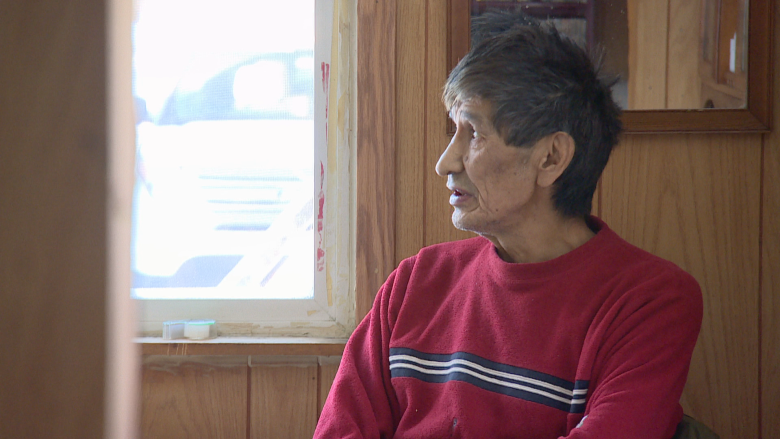Man living in shack on northern Alberta reserve pleads for housing with running water
A man living in a shack without running water for more than 12 years on a northern Alberta reserve is asking for help.
Gary Grandbois, 59, doesn't have power or a proper heat source.
"I've got to be honest with myself about how I'm living here. I'm not lying about how I'm living," said Grandbois, who lives on Cold Lake First Nations, about 275 kilometres northeast of Edmonton.
More than 44 per cent of First Nations people living on reserves reported in the most recent census that they lived in substandard housing.
The federal government has said a new Indigenous housing strategy is coming. First Nations leaders say that to address the scale of the problem, more resources are required than past federal officials have been willing to commit.
While according to the census, about half the houses on Cold Lake First Nations require major repairs, band councillor Dean Janvier said all homes owned by the band do have running water. He said Grandbois's house isn't owned by the band.
Grandbois, who maintains the original structure was assigned to him by the band, has a mountain of paperwork detailing years of appeals to the band council to improve his situation.
Conditions 'especially poor'
A copy of a memo from 2010 to Cold Lake First Nations administration states: "I've been asking for cupboards and running water … I would like or prefer a new house."
A 2012 Health Canada inspection report, written following a complaint he says he filed about his housing condition, said that his home was deemed "unfit for human habitation" and recommended moving him to another residence.
"If the occupant is not provided with another residence, extensive renovations will be required to ensure this home is habitable," the report said.
It was sent to the band's then-technical director as well as two staff at the reserve health centre.
Jeff Kresowaty, of the First Nations and Inuit Health Branch in Alberta, responsible for the inspections, said it is up to individual bands how they respond to recommendations in an inspection report, like the Health Canada report done on Grandbois's house in 2012.
While the report cites provincial housing regulations as benchmarks, they don't apply on a reserve.
"I can say that when we conduct these inspections, we do often see substandard conditions," Kresowaty said. "However, the conditions that were described in this inspection report are especially poor."
Feeling neglected
Grandbois recently placed a sign calling for the attention of chief and council at the bottom of his driveway facing the road.
"I am Disableity person being nelgect on Cold Lake First Nation. No proper housing for 12 years," it reads.
Cold Lake First Nations band councillor Janvier said he couldn't speak for how past band governments have dealt with Grandbois's housing concerns. But the current band council, which was elected 18 months ago, only learned of Grandbois's situation when contacted by CBC News, he said.
"Any dealings that Mr. Grandbois had with previous chiefs and councils, he hasn't brought any of that to our attention and we have an open-door policy," he said. "If Mr. Grandbois comes in and presents his information to us, we'd be happy to meet with him."
Grandbois's sister, who also lives on the Cold Lake First Nations reserve, suggests there's broad awareness of her brother's situation.
"Probably the whole reserve knows how he's living," Gardenia Grandbois said.
Gary Grandbois said that in 2005, when he moved back onto the lands his family have traditionally occupied on the reserve, he was given a one-room cabin. He thought it would only be temporary, but when it started to get colder, he filled the gaping cracks between the boards with putty to keep the wind out.
As time went on, he made other modifications. He covered the porch he built out of scraps from the sawmill. That has become his kitchen. Then he added an extension to one end of the cabin. That's where he sleeps.
Grandbois, who has been unable to work since 2005 when he was seriously injured in a car accident, said he has spent his disability cheques on the renovations. But he still lacks basic amenities.
Retrieves water from sister's home
To get water, Grandbois gets in his truck and drives around to the other side of the property where his sister's family of eight has a band-owned trailer. Every few days, he fills four five-gallon water jugs in his sister's bathtub.
At home. he heats some of the water in a casserole dish on top of the rickety wood stove that he installed. He either makes coffee, or waits for the water to cool off if he wants a cool drink. He'll repeat the process when he wants to have a sponge bath or clean his few plates, cups and utensils.
He doesn't have a washroom.
"That's my toilet," Grandbois said, pointing to a small, covered garbage can. "I don't like to say it, but I have no choice."
Grandbois's power was cut in November when his unpaid bills began piling up.
He split costs with a longtime girlfriend, he said. But she moved out a year ago, unable to tolerate the living conditions any longer.
Housing shortage across reserve
Grandbois has a copy of an official Cold Lake First Nations memo he filed in April 2010, addressed to chief and council, outlining his grim living situation. He also has a copy of one he sent in November 2010.
Janvier said he's not familiar with the documents from 2010 — or the Health Canada report from 2012. He said he couldn't comment on the actions of previous councils.
"I don't know the current status of his specific structure. He'd have to come in and explain that to us," Janvier said.
Cold Lake First Nations, which wholly owns 16 companies under the Primco Dene banner, is facing a severe housing shortage, Janvier said.
He noted an annual budget detailing where all band money goes is presented to all band members for approval each year.
Janvier said Cold Lake First Nations, with about 1,300 people living on reserve, only has $198,000 in federal funding annually for its 300-plus homes. According to the 2016 census, about half of the homes are in need of major repairs.
"We have a lot of serious problems that we're trying to address and it affects all of our nation members, not just Mr. Grandbois," Janvier said.
roberta.bell@cbc.ca
@roberta__bell







